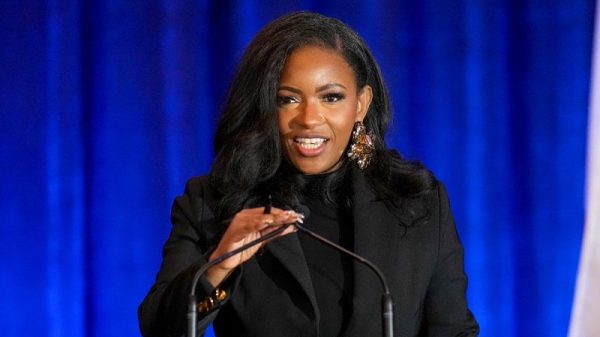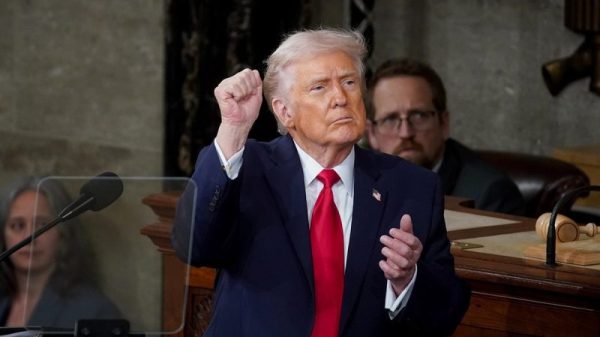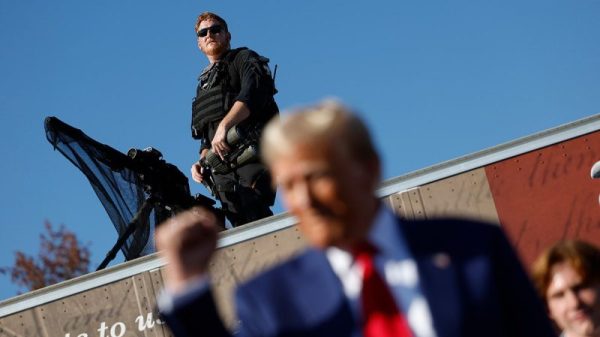Donald Trump this week bragged about purportedly acing a widely used cognitive test that was administered to him when he was president, suggesting that the test included identifying drawings of three animals.
“I think it was 35, 30 questions,” the former president said in Portsmouth, N.H., of the test, which he said involved a few animal identification queries. “They always show you the first one, like a giraffe, a tiger, or this, or that — a whale. ‘Which one is the whale?’ Okay. And that goes on for three or four [questions] and then it gets harder, and harder, and harder.”
The only problem: The creator of the test in question, called the Montreal Cognitive Assessment, or MoCA, said it has never included the specific combination of animals described by Trump in any of its versions over the years.
In fact, Ziad Nasreddine, a Canadian neurologist who invented the test, said the assessment — intended primarily to test for signs of dementia or other cognitive decline — has never once included a drawing of a whale.
“I don’t think we have a version with a whale,” said Nasreddine, who added there are three versions of the test currently in circulation.
He and other physicians allowed for the possibility that Trump was just offering hypothetical examples. The Trump campaign did not respond to a request for comment.
For nearly four years, Trump has periodically boasted about his performance on the cognitive test, always tweaking the questions he alleges he aced, from correctly reciting a series of words in order — “Person. Woman. Man. Camera. TV.” — to, most recently, identifying an animal — a whale — that did not appear on the test.
Experts also note that the assessment is not an I.Q. or intelligence test, though Trump has often talked about it as if it was.
“It’s a very, very low bar for somebody who carries the nuclear launch codes in their pocket to pass and certainly nothing to brag about,” said Jonathan Reiner, a cardiologist and professor of medicine and surgery at the George Washington School of Medicine & Health Sciences.
Addressing the crowd of supporters Wednesday night in Portsmouth, Trump continued with his riff on the test, seeming to wholly invent another hypothetical question.
“Then it’s multiply 3,293 times four, divide by 3,” Trump crowed. “They have plenty of tough stuff.” (The answer: 4,390.67).
Trump was responding to ramped-up attacks from former South Carolina governor and U.N. ambassador Nikki Haley, 51, one of his 2024 primary opponents who in recent days has begun arguing that both Trump, 77, and President Biden, 81, are too old to be president, and that the nation deserves a new generation of leaders.
Voters, however, generally express more concern about Biden’s age than Trump’s. In a November Marquette Law School national poll asking whether Biden and Trump are “too old to be president,” a 57 percent majority said this describes Biden “very well” compared with 23 percent for Trump. Eighty percent said that describes Biden at least somewhat well, compared with 51 percent who said that of Trump.
Trump’s obsession with the MoCA first burst into public view during the summer of 2020, when he went on Fox News to brag about taking the test and doing “amazing.” It was then that Trump uttered the now-famous — and widely mocked — sequence of words he claims he was asked to repeat back to his doctor: “Person. Woman. Man. Camera. TV.”
“If you get it in order, you get extra points,” Trump said, strongly implying that he had achieved this extra credit status.
The moment spawned its own news cycle, complete with late-night TV jokes, memes and branded clothing emblazoned with the five memorable words. The New York Times described it as “the haiku of the 2020 campaign.”
But, much like the phantom whale, Nasreddine said the words in the cognitive testing sequence are supposed to be unrelated, so the MoCA would never have a pair of connected words like “woman” and “man,” or “camera” and “TV.”
The MoCA’s words, animals and other elements are selected with an intent to assess multiple cognitive domains that relate to human memory and brain function, Nasreddine said.
For instance, the test always includes one animal that is fairly well-known and easily identified, such as a lion, and other animals that are less well-known and harder to pronounce, such as a rhinoceros. Other parts of the test, which gauge skills such as concentration and calculation, are harder.
“Some elements look simple [if you] don’t have any kind of impairment,” Nasreddine added. “That’s the purpose of the test.”
Physicians said the test is frequently performed during annual wellness visits or when there’s a specific reason to check mental acuity.
“I would do this [test] for older adults and for those where I have concerns about cognitive decline,” said Ishani Ganguli, a primary care physician at Harvard Medical School and Brigham and Women’s Hospital, who said she’s administered the test to patients for about a decade.
Ganguli said that her team often administers an abbreviated version of a cognition test — no animal naming — as a standard screening for patients who are 65 years or older, and performs the full test when a patient, a patient’s family or someone else has raised concerns.
In 2018, Trump’s White House doctor, then-Navy Rear Adm. Ronny Jackson, appeared in the briefing room to inform reporters that he had administered the MoCA as part of the president’s 2018 physical. Jackson described Trump as “very sharp” and “very articulate,” and said he only performed the cognitive test because Trump had specifically requested it. Jackson, now a Republican congressman from Texas, did not immediately respond to a request for comment.
Trump’s fibs, exaggerations and outright lies are now a standard element of his bid to return to the White House. The Washington Post tracked more than 30,000 misleading or false claims during Trump’s four years as president.
That loose relationship with the truth has also extended to Trump’s health. His personal physician, Harold Bornstein, in 2015 predicted that Trump would be the “healthiest president ever” if elected. Bornstein, who died in 2021, later said that Trump dictated the note.
Ganguli said she’s never deviated from the prepared test with her own list of words or drawings of animals, nor knew other physicians who had.
“There’s a beautiful test already in existence. Why would I go off-book?” she said.
She added that she did not recall a patient who celebrated passing the test, let alone publicly proclaimed it. “It’s treated with gravitas,” Ganguli said. “If anything, I see the opposite — people disappointed with how they performed.”
Trump, however, is not among the legions of the disappointed.
Before he began publicly referencing the test, and sharing what he claimed were specific details, Trump started privately boasting about his performance, as well, which The Post first reported at the time.
One attendee remembers Trump bringing up the test in a crowded June 4, 2020, meeting intended to focus on his reelection campaign. More than two dozen top White House, campaign and Republican National Committee aides had piled into the Cabinet Room — chairs lined the walls, as well as the table in the center of the space — when Trump suddenly asked the assembled crowd if he should challenge Biden to a cognitive test.
No, came the reply, prompting Trump to begin opining — at length — about the MoCA, and how he had correctly recited five words in order, said the attendee, who spoke on the condition of anonymity Friday to share candid details of a private meeting.
At the time, the White House was still deep in the throes of the covid pandemic, as well as grappling with the aftermath of the killing of George Floyd, an unarmed Black man whose death at the hands of White police officers became a potent national rallying cry for racial justice.
Though Trump’s lengthy recounting prompted light laughter in the room, the non-sequitur felt discordant.
“That’s what stuck with me — we have the racial unrest, the pandemic, and we’re spending a long time talking about this,” the attendee said.
Four years later, the memory still lingers: “I just remember when I walked out, saying to a co-worker, ‘That was nuts,’” they said with a laugh.
Scott Clement contributed to this report
Donald Trump this week bragged about purportedly acing a widely used cognitive test that was administered to him when he was president, suggesting that the test included identifying drawings of three animals.
“I think it was 35, 30 questions,” the former president said in Portsmouth, N.H., of the test, which he said involved a few animal identification queries. “They always show you the first one, like a giraffe, a tiger, or this, or that — a whale. ‘Which one is the whale?’ Okay. And that goes on for three or four [questions] and then it gets harder, and harder, and harder.”
The only problem: The creator of the test in question, called the Montreal Cognitive Assessment, or MoCA, said it has never included the specific combination of animals described by Trump in any of its versions over the years.
In fact, Ziad Nasreddine, a Canadian neurologist who invented the test, said the assessment — intended primarily to test for signs of dementia or other cognitive decline — has never once included a drawing of a whale.
“I don’t think we have a version with a whale,” said Nasreddine, who added there are three versions of the test currently in circulation.
He and other physicians allowed for the possibility that Trump was just offering hypothetical examples. The Trump campaign did not respond to a request for comment.
For nearly four years, Trump has periodically boasted about his performance on the cognitive test, always tweaking the questions he alleges he aced, from correctly reciting a series of words in order — “Person. Woman. Man. Camera. TV.” — to, most recently, identifying an animal — a whale — that did not appear on the test.
Experts also note that the assessment is not an I.Q. or intelligence test, though Trump has often talked about it as if it was.
“It’s a very, very low bar for somebody who carries the nuclear launch codes in their pocket to pass and certainly nothing to brag about,” said Jonathan Reiner, a cardiologist and professor of medicine and surgery at the George Washington School of Medicine & Health Sciences.
Addressing the crowd of supporters Wednesday night in Portsmouth, Trump continued with his riff on the test, seeming to wholly invent another hypothetical question.
“Then it’s multiply 3,293 times four, divide by 3,” Trump crowed. “They have plenty of tough stuff.” (The answer: 4,390.67).
Trump was responding to ramped-up attacks from former South Carolina governor and U.N. ambassador Nikki Haley, 51, one of his 2024 primary opponents who in recent days has begun arguing that both Trump, 77, and President Biden, 81, are too old to be president, and that the nation deserves a new generation of leaders.
Voters, however, generally express more concern about Biden’s age than Trump’s. In a November Marquette Law School national poll asking whether Biden and Trump are “too old to be president,” a 57 percent majority said this describes Biden “very well” compared with 23 percent for Trump. Eighty percent said that describes Biden at least somewhat well, compared with 51 percent who said that of Trump.
Trump’s obsession with the MoCA first burst into public view during the summer of 2020, when he went on Fox News to brag about taking the test and doing “amazing.” It was then that Trump uttered the now-famous — and widely mocked — sequence of words he claims he was asked to repeat back to his doctor: “Person. Woman. Man. Camera. TV.”
“If you get it in order, you get extra points,” Trump said, strongly implying that he had achieved this extra credit status.
The moment spawned its own news cycle, complete with late-night TV jokes, memes and branded clothing emblazoned with the five memorable words. The New York Times described it as “the haiku of the 2020 campaign.”
But, much like the phantom whale, Nasreddine said the words in the cognitive testing sequence are supposed to be unrelated, so the MoCA would never have a pair of connected words like “woman” and “man,” or “camera” and “TV.”
The MoCA’s words, animals and other elements are selected with an intent to assess multiple cognitive domains that relate to human memory and brain function, Nasreddine said.
For instance, the test always includes one animal that is fairly well-known and easily identified, such as a lion, and other animals that are less well-known and harder to pronounce, such as a rhinoceros. Other parts of the test, which gauge skills such as concentration and calculation, are harder.
“Some elements look simple [if you] don’t have any kind of impairment,” Nasreddine added. “That’s the purpose of the test.”
Physicians said the test is frequently performed during annual wellness visits or when there’s a specific reason to check mental acuity.
“I would do this [test] for older adults and for those where I have concerns about cognitive decline,” said Ishani Ganguli, a primary care physician at Harvard Medical School and Brigham and Women’s Hospital, who said she’s administered the test to patients for about a decade.
Ganguli said that her team often administers an abbreviated version of a cognition test — no animal naming — as a standard screening for patients who are 65 years or older, and performs the full test when a patient, a patient’s family or someone else has raised concerns.
In 2018, Trump’s White House doctor, then-Navy Rear Adm. Ronny Jackson, appeared in the briefing room to inform reporters that he had administered the MoCA as part of the president’s 2018 physical. Jackson described Trump as “very sharp” and “very articulate,” and said he only performed the cognitive test because Trump had specifically requested it. Jackson, now a Republican congressman from Texas, did not immediately respond to a request for comment.
Trump’s fibs, exaggerations and outright lies are now a standard element of his bid to return to the White House. The Washington Post tracked more than 30,000 misleading or false claims during Trump’s four years as president.
That loose relationship with the truth has also extended to Trump’s health. His personal physician, Harold Bornstein, in 2015 predicted that Trump would be the “healthiest president ever” if elected. Bornstein, who died in 2021, later said that Trump dictated the note.
Ganguli said she’s never deviated from the prepared test with her own list of words or drawings of animals, nor knew other physicians who had.
“There’s a beautiful test already in existence. Why would I go off-book?” she said.
She added that she did not recall a patient who celebrated passing the test, let alone publicly proclaimed it. “It’s treated with gravitas,” Ganguli said. “If anything, I see the opposite — people disappointed with how they performed.”
Trump, however, is not among the legions of the disappointed.
Before he began publicly referencing the test, and sharing what he claimed were specific details, Trump started privately boasting about his performance, as well, which The Post first reported at the time.
One attendee remembers Trump bringing up the test in a crowded June 4, 2020, meeting intended to focus on his reelection campaign. More than two dozen top White House, campaign and Republican National Committee aides had piled into the Cabinet Room — chairs lined the walls, as well as the table in the center of the space — when Trump suddenly asked the assembled crowd if he should challenge Biden to a cognitive test.
No, came the reply, prompting Trump to begin opining — at length — about the MoCA, and how he had correctly recited five words in order, said the attendee, who spoke on the condition of anonymity Friday to share candid details of a private meeting.
At the time, the White House was still deep in the throes of the covid pandemic, as well as grappling with the aftermath of the killing of George Floyd, an unarmed Black man whose death at the hands of White police officers became a potent national rallying cry for racial justice.
Though Trump’s lengthy recounting prompted light laughter in the room, the non-sequitur felt discordant.
“That’s what stuck with me — we have the racial unrest, the pandemic, and we’re spending a long time talking about this,” the attendee said.
Four years later, the memory still lingers: “I just remember when I walked out, saying to a co-worker, ‘That was nuts,’” they said with a laugh.
Scott Clement contributed to this report





















